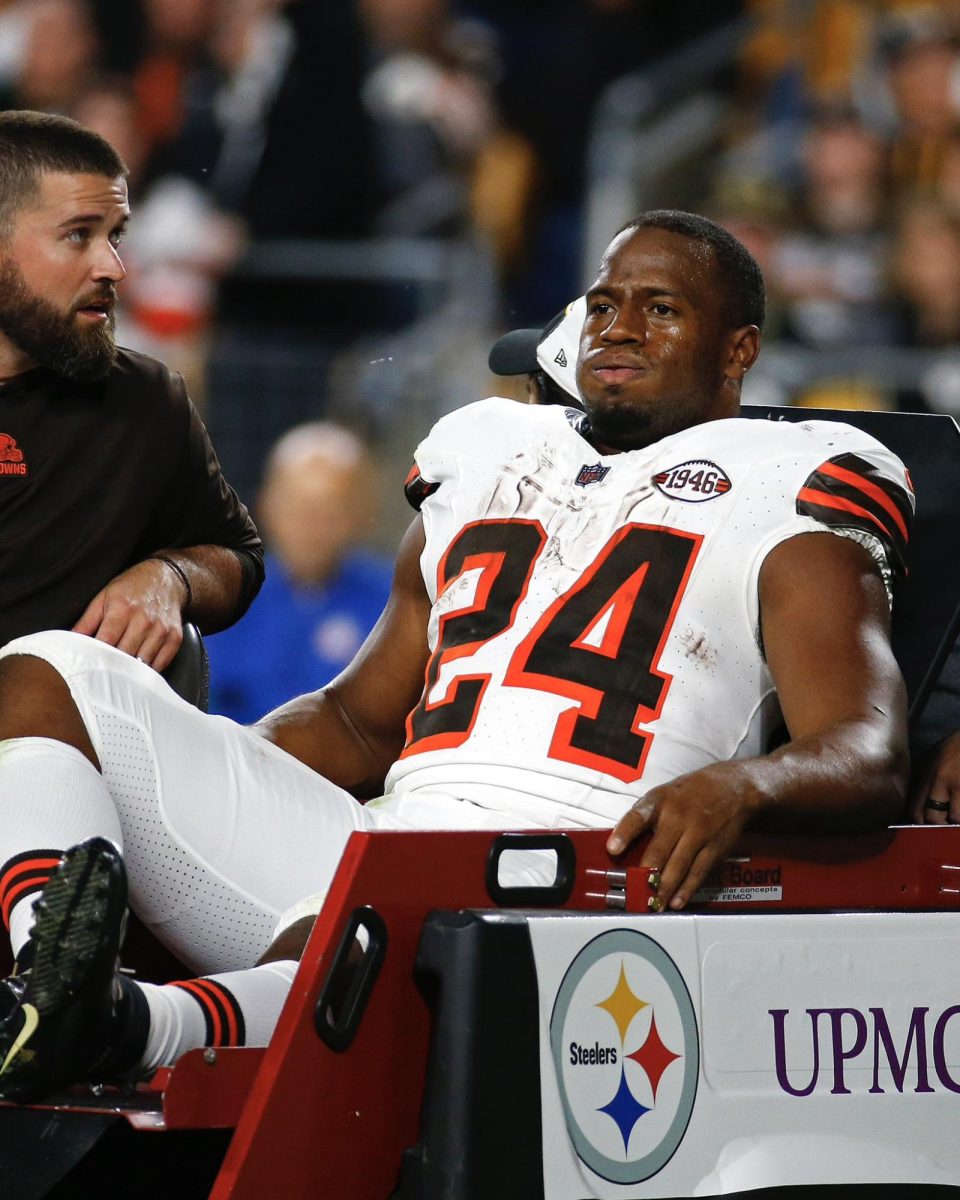On the latest edition of Monday Night Football, Cleveland Browns running back Nick Chubb suffered a gruesome, season-ending injury to his left knee. It’s one of those injuries that you need to issue a graphic content warning for. I’m not going to go into detail about it, but to put it simply, Chubb’s knee bent in a way that no human knee should ever bend. The injury was so bad that the ABC broadcast refused to show a replay.
In the classic wide television angle, all you see on the play is Chubb getting flipped over. Most viewers didn’t even realize that he was injured until cameras zoomed in on Chubb sitting up, shaking his head and signaling to his teammates that he was unable to get up.
It’s at this point that we’d usually get a replay of the last play. Much more often than not following an injury of any severity, the television broadcast will cut to numerous slow motion angles of the previous play, giving us a crystal clear view of the injury.
That wasn’t the case on Monday. “I am told that the replay of Nick Chubb getting injured is not to be seen,” interjected Joe Buck as the ABC broadcast cut to an overhead shot. Hall of Fame quarterback Troy Aikman, working alongside Buck, quickly voiced his support of the decision. “Yeah we’re not gonna show it. It’s about as bad as you can imagine.”
It might sound weird to praise ABC for this. Am I really going to give them credit for electing to not show a human being suffering a horrific injury? Part of the problem is it’s so rare to see a television broadcast do this.
In November 2018, Washington Commanders quarterback Alex Smith suffered a life-threatening injury to his right leg. At one point, doctors feared amputation would be his only option. Smith was able to keep his leg and after 17 different surgeries, miraculously returned to the NFL for another season. I say all this to say that even on this injury, easily one of the worst not just in football but in sports history, the CBS broadcast still showed a slow-motion replay one time.
Can we even give credit to ABC who’s had their own recent issues as well? Just last year, Buffalo Bills safety Damar Hamlin collapsed on the field due to a cardiac arrest. With his life clearly in danger, Hamlin was rushed to the hospital, intubated and hospitalized for over a week. Despite the fact that, even in the moment, Hamlin’s life was clearly in danger, ABC’s partner company ESPN cut to numerous replays on a broadcast that also featured Buck and Aikman, sparking discourse as to whether or not it was ethical for them to continue to show it.
One of the biggest critiques of the NFL is that players are treated like products, not people. That goes for both the league itself and the media that covers it. To see that this ABC broadcast took into consideration the humanity of Chubb is a small but poignant stance against a society that too often dehumanizes the very same players they dedicate every weekend to. It probably doesn’t excuse past critiques, but maybe it indicates a shift in philosophy moving forward.
This moment is somewhat undercut by the fact that the alternative angle, which displayed every vivid detail of the nauseating injury, was released to social media several minutes after the injury. Any fan that wished to see what exactly happened to Chubb’s knee could find it very easily on Twitter. In fact, if you looked up Chubb’s name into Twitter on Monday night, the first videos that popped up weren’t ABC’s broadcast angle, but the alternative angle.
This discussion delves far deeper than whether or not a television broadcast decides to show a replay of an injury. It begs the question, “Why are we so captured by watching sports injuries?”
I’d be lying to you if I said I wasn’t immensely curious about what exactly happened to Chubb’s knee. And I’d be lying to you if I said that I didn’t watch the alternative angle. I’ve watched it multiple times. Clearly, I’m not the only one either. Once the video found its way to Twitter, it was posted by numerous accounts and screenshots were posted in bunches.
It’s not that there’s any pleasure in watching the video or looking at the screenshot. It’s absolutely stomach churning. My initial reaction to watching the alternate angle was an involuntary groan of horror. Nothing about watching the video is enjoyable in any way. But for some fans, myself included, there’s this insatiable curiosity and this need to know exactly what happened. I’ve watched a lot of awful injuries in my 20 years as a sports fan. Part of me wanted to know just how bad this one was in comparison to what I’ve seen.
Sports fans have become used to watching injuries on TV. Every time a player goes down, we expect to see a replay. Often we play armchair doctor about what exactly the injury is and how long the player will be out. It’s become somewhat of a habit. But just because we’ve been doing something for a long time doesn’t mean we should continue to do it.
It’s really hard to justify watching replays of injuries to athletes from an ethical perspective. At a base level, you’re watching one of the lowest moments in an athlete’s life again and again and again. Obviously no one can control what gets shown on a live play of a live game, but we can control what gets shown after the play. As nice as it would be, it feels unrealistic to expect fans to temper their morbid curiosity. More television networks need to follow in the footsteps of Monday’s ABC broadcast and consider the ethics of what they show on replays.
There used to be a time where sports broadcasts would show fans that ran onto the field. Over time, broadcasts stopped showing these fans to take away the source of attention that they were craving. In a similar vein, television broadcasts need to take away the source that encourages this interest and this curiosity when it comes to these gruesome injuries.
At first I thought that the stance the ABC broadcast made was all for naught since the replay made its way into the ether anyway.
But the more I think about it, the more I admire their decision, if only on principle alone. It’s already sparked conversation online with NFL reporters like Ari Meirov voicing their support. Before we can solve the issue, we need to be aware that it is an issue. That alone might be enough to get the ball rolling in the right direction.






































































































































































































